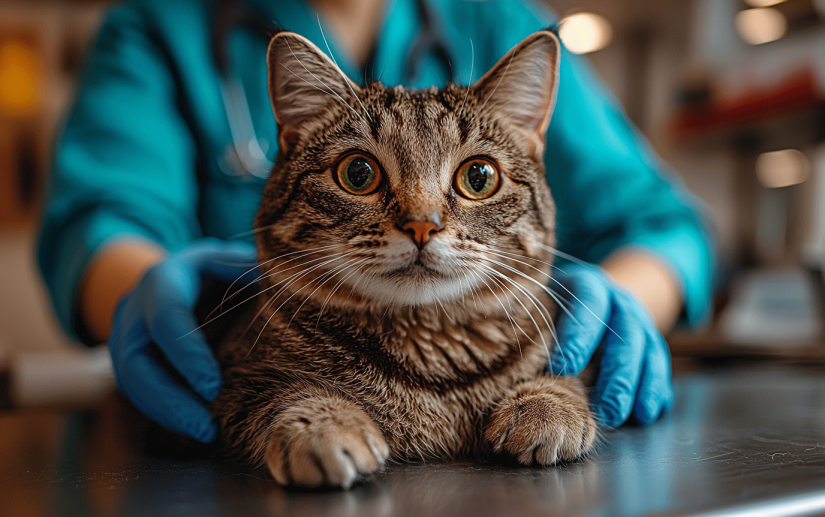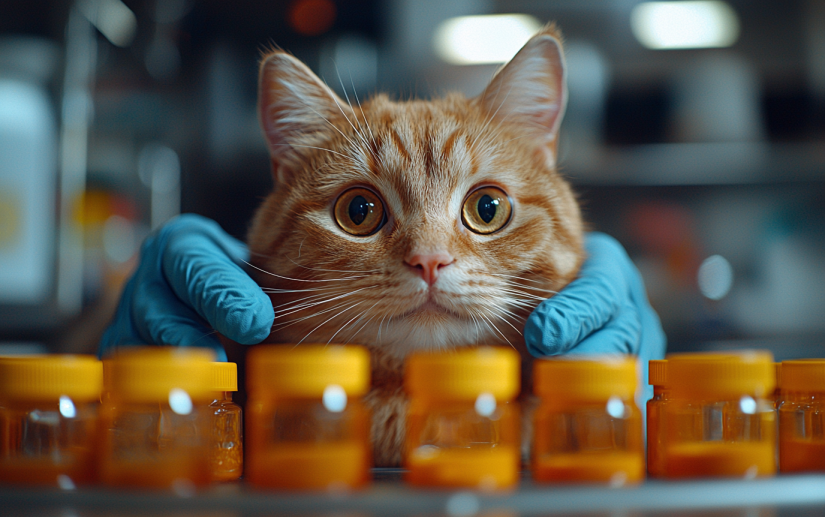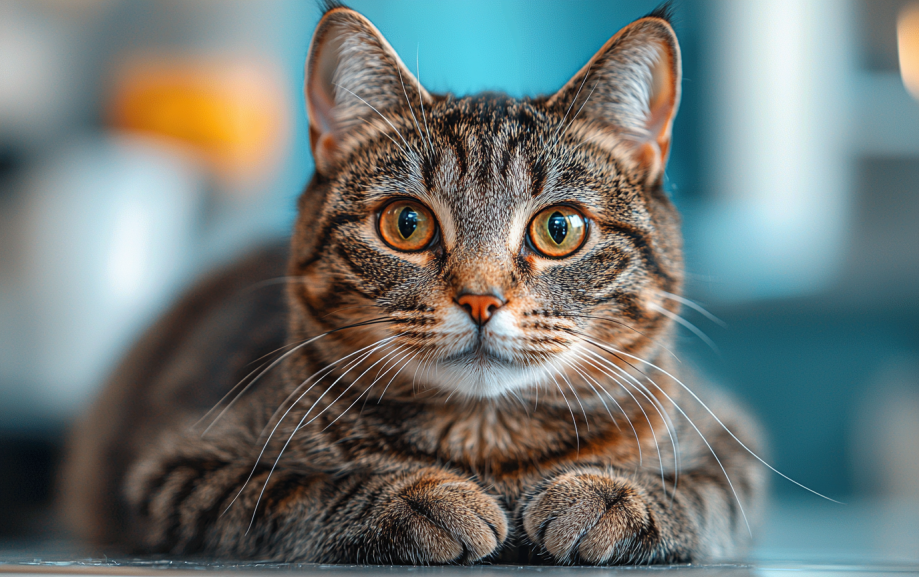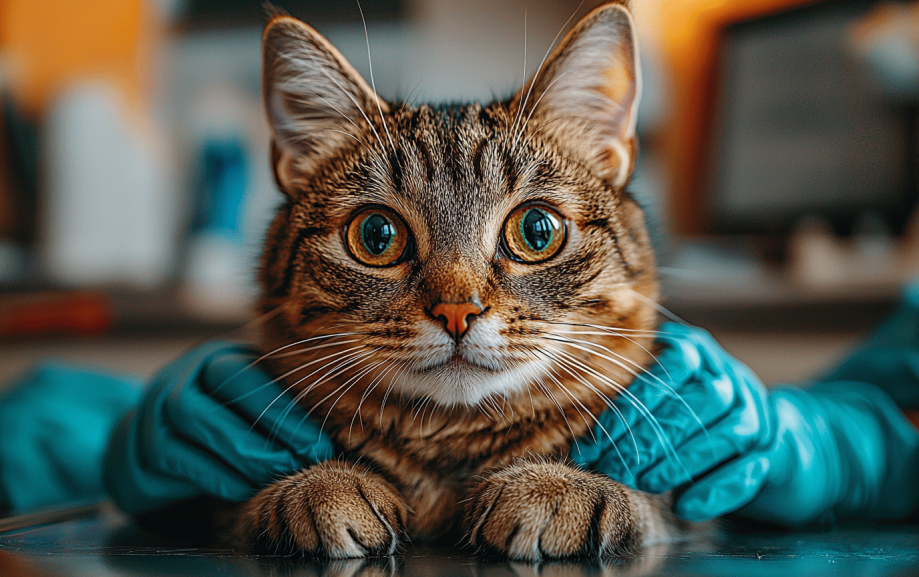Types of Heart Disease in Cats
Hypertrophic Cardiomyopathy (HCM)
Hypertrophic Cardiomyopathy (HCM) is the most common form of heart disease in cats. It occurs when the heart muscle thickens, making it harder for the heart to pump blood effectively. This condition is often genetic and can lead to severe complications, including heart failure.
Dilated Cardiomyopathy (DCM)
Dilated Cardiomyopathy (DCM) is less common but still significant. In DCM, the heart’s chambers become enlarged and the muscle walls thin, leading to a weakened heart that struggles to pump blood efficiently. This condition was once more prevalent when cat foods were deficient in taurine, but it’s still seen today, albeit rarely.
Congenital Heart Defects
Some cats are born with heart defects, such as a hole in the heart or malformed valves. These congenital heart defects can lead to heart disease early in life and require careful management.
Heart Murmurs
Heart murmurs are not a disease but a symptom. They are abnormal sounds heard during a heartbeat that can indicate underlying heart issues. Not all murmurs are serious, but they warrant further investigation to rule out heart disease.
Symptoms and Warning Signs
Early Detection
Catching heart disease early can make a significant difference in treatment outcomes. However, because cats are adept at masking their symptoms, it’s crucial for owners to be vigilant and aware of subtle changes in their cats’ behavior or health.
Common Symptoms
Some of the more apparent signs of heart disease in cats include lethargy, rapid or labored breathing, coughing, and a noticeable decrease in activity. Cats may also exhibit signs of distress or weakness, particularly after physical activity.
Subtle Signs to Watch For
More subtle signs include changes in appetite, weight loss, fainting, or collapsing. Even something as seemingly benign as sleeping in a different position or place could indicate discomfort related to heart disease. Cats may also develop a bluish tint to their gums or tongue, signaling poor oxygenation due to heart problems.
Causes and Risk Factors

Genetic Factors
Many heart diseases in cats have a genetic component. Breeds like the Maine Coon, Ragdoll, and British Shorthair are particularly prone to HCM due to inherited genes. If you have a cat from a breed with known heart issues, regular vet check-ups are essential.
Age and Environmental Influences
As cats age, the risk of heart disease increases. Environmental factors, such as exposure to toxins or stress, can also contribute to heart disease. Cats living in high-stress environments or those with poor living conditions are more likely to develop heart problems.
The Role of Diet and Nutrition
Nutrition plays a critical role in heart health. A deficiency in essential nutrients like taurine can lead to heart disease, particularly DCM. Ensuring your cat has a balanced diet that meets all their nutritional needs is crucial in preventing heart-related issues.
Diagnosis and Testing
Veterinary Examinations
If heart disease is suspected, a thorough veterinary examination is necessary. This will typically include listening to the heart with a stethoscope to detect murmurs or arrhythmias and checking for other physical signs of heart disease.
Diagnostic Tools and Tests
Veterinarians may use various diagnostic tools to confirm heart disease, including echocardiograms (an ultrasound of the heart), X-rays, and electrocardiograms (EKG/ECG). Blood tests may also be conducted to check for biomarkers that indicate heart stress or damage.
Treatment Options
Medications and Therapies
While there is no cure for most heart diseases in cats, medications can help manage the condition and alleviate symptoms. Common treatments include beta-blockers, ACE inhibitors, diuretics, and anticoagulants. These medications work by reducing the workload on the heart, improving blood flow, or preventing blood clots.
Surgical Interventions
In some cases, surgery may be required to correct a congenital defect or to place a pacemaker if the cat’s heart rhythm is severely abnormal. These interventions are less common and are usually considered only when medication alone isn’t sufficient.
Lifestyle Changes
Adjusting your cat’s lifestyle can also help manage heart disease. This may include modifying their diet to reduce sodium intake, encouraging moderate exercise to maintain a healthy weight, and creating a stress-free environment.
Managing Heart Disease in Cats
Diet and Exercise
A diet low in sodium and rich in essential nutrients is vital for cats with heart disease. Specially formulated heart diets may be recommended by your vet. Exercise should be moderate, avoiding strenuous activities that could overburden the heart.
Monitoring and Regular Check-ups
Regular veterinary check-ups are crucial for managing heart disease. Monitoring the condition through frequent assessments allows for timely adjustments in treatment, ensuring the best possible outcome for your cat.
Palliative Care
In advanced stages of heart disease, palliative care may become necessary. This involves making your cat as comfortable as possible and managing pain or distress. It’s important to discuss with your vet the best ways to support your cat during this time.
READ ALSO: Managing Colitis in Cats: Prevention, Diagnosis, and Care
Dietary Considerations for Cats with Heart Disease

Low-Sodium Diets
A low-sodium diet can help reduce the strain on your cat’s heart by minimizing fluid retention and reducing blood pressure. Your veterinarian may recommend specific heart-healthy cat food formulas designed to support cardiovascular health.
Taurine Supplementation
Taurine, an essential amino acid for cats, plays a critical role in heart health. Ensure your cat’s diet includes adequate taurine levels, especially if they have been diagnosed with or are at risk for Dilated Cardiomyopathy (DCM).
Hydration
Proper hydration is vital for cats with heart disease, but excessive fluid intake can sometimes be problematic, depending on the type and severity of the condition. Discuss with your veterinarian the best ways to keep your cat hydrated without overburdening their heart.
Prevention and Long-term Care
Preventative Measures
While not all heart diseases are preventable, taking proactive steps can reduce the risk. This includes providing a balanced diet, ensuring regular veterinary care, and minimizing stress in your cat’s environment.
Importance of Regular Vet Visits
Routine vet visits are essential, particularly for older cats or breeds predisposed to heart disease. Early detection through regular check-ups can catch heart disease before it becomes severe, allowing for more effective management.
Prognosis and Quality of Life
Life Expectancy
The life expectancy of a cat with heart disease varies depending on the type and severity of the condition. With proper management, many cats can live for several years after diagnosis. However, the prognosis is often guarded, and it’s important to maintain realistic expectations.
Improving Quality of Life
Focus on enhancing your cat’s quality of life by providing a loving, stress-free environment. Regular vet visits, proper nutrition, and adherence to treatment plans can make a significant difference in your cat’s well-being.
How to Support a Cat with Heart Disease Emotionally
Creating a Comfortable Environment
Cats with heart disease can become easily stressed, which can exacerbate their condition. Creating a calm, safe, and comfortable environment is crucial. Ensure your cat has a quiet place to rest, away from loud noises and other pets that might cause anxiety. Consider using calming products like pheromone diffusers to reduce stress.
Bonding and Mental Stimulation
While physical activity might be limited, mental stimulation is still important for your cat’s well-being. Engage your cat with gentle, low-energy activities, such as puzzle toys or interactive play sessions that don’t require strenuous effort. Spending quality time with your cat and maintaining a strong bond can also provide emotional support and reduce stress.
How to Communicate with Your Veterinarian About Your Cat’s Heart Disease
Asking The Right Questions
When your cat is diagnosed with heart disease, it’s important to ask your veterinarian detailed questions. Inquire about the type of heart disease, the severity, treatment options, and what to expect in terms of prognosis. Understanding the condition fully will help you make informed decisions about your cat’s care.
Understanding Medication and Treatment Plans
Make sure you have a clear understanding of any prescribed medications, including their purpose, dosage, and potential side effects. Ask your vet how to administer these medications effectively and what to do if your cat misses a dose.
Scheduling Regular Follow-ups
Consistent communication with your veterinarian is crucial for managing heart disease. Schedule regular follow-up appointments to monitor your cat’s condition and adjust treatment plans as necessary. Keep a log of your cat’s symptoms and behavior changes to discuss during these visits.
Common Myths and Misconceptions

Myth: Only Older Cats Get Heart Disease
While age can be a risk factor, heart disease can affect cats of all ages, including kittens, particularly if they have congenital heart defects or a genetic predisposition.
Myth: Indoor Cats Are Not at Risk
Indoor cats are not immune to heart disease. Although they might avoid some environmental risks, genetic factors, diet, and other health conditions can still lead to heart issues.
Myth: Cats Will Always Show Obvious Symptoms
Cats are masters at hiding illness, and heart disease symptoms can be very subtle. By the time symptoms become obvious, the disease may already be advanced, making regular vet check-ups essential for early detection.
Conclusion
Heart disease in cats is a serious condition that requires careful management and attention. By understanding the types, symptoms, and treatment options available, you can help your feline friend live a longer, healthier life. Regular veterinary care, a balanced diet, and a loving environment are your best tools in supporting a cat with heart disease. Remember, early detection is crucial—don’t hesitate to seek veterinary advice if you notice any changes in your cat’s behavior or health.

